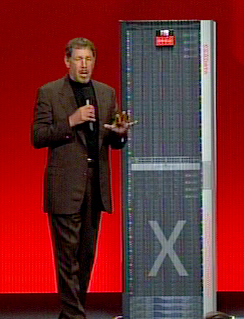Oracle enters hardware market; Launches storage server to ride shotgun with database

Oracle CEO Larry Ellison on Wednesday unveiled its first ever hardware product--a storage server with embedded software designed to work with the company's databases and be used in a grid. The Exadata programmable storage server aims to put database intelligence next to each drive. Oracle and HP also launched a "database machine."

Ellison, speaking at Oracle's OpenWorld conference, said large databases are creating a fundamental problem: Disk storage systems can't cope with data that has to be moved off of drives to database servers. He called it a "data bandwidth problem."
As data gets larger the slowdowns become more unbearable. At one terabyte you will notice data bandwidth slippage. At 10 terabytes, storage systems crawl. "At one terabyte the problem rears its ugly head and it gets worse every year," said Ellison.
Ellison outlined query processing and how Oracle's embedded software will handle query processing and other functions more efficiently. Oracle is hoping to sell its storage hardware as part of a grid. Drives will be searched in parallel also.
With the move, Oracle is copying the model of Apple to a degree. Ellison is arguing that combined hardware and software efforts can be more effective. Instead of the consumer market, where Apple's secret sauce is tightly integrated hardware (iPods) and software (iTunes), Oracle is coupling its database software with custom hardware to revamp data centers.
The Exadata storage server (above) will be immediately available on Linux running on Intel, but Ellison noted other flavors for various platforms "are on the way." Oracle's move could be disruptive in the storage market and players like EMC and IBM since it can offer a joint software hardware sale and leverage its HP's partnership. HP and Oracle are also rolling out an "Oracle database machine," designed for customers that don't want to configure the systems. The initial machine has 168 terabytes of disk data and 64 Intel cores.
Update: Ellison took some shots at Netezza and Teradata, noting they had some advantages but couldn't measure up to Oracle's hardware, which balances multiple hardware and software requirements. Ellison didn't have benchmarks, but did note that Oracle's hardware is available immediately. HP is building the hardware and will handle warranty and other issues.
Netezza responded quickly to Ellison's jab. In a statement Jim Baum, president and chief operating officer of the company said:
"For years the old, incumbent vendors have tried to bolt together their products to try and tackle the data warehouse appliance market---and every one was a failure. You just can't slap together existing solutions in clever packaging and expect to deliver much faster performance. The power and simplicity of the data warehouse appliance model lies in integration and design from the ground up. Engineers in the same company, the same building, working to integrate a shared vision---not patch it together with glue and spit."
HP CEO Mark Hurd joined Ellison via video conference. Hurd said Oracle and HP have been working on the storage issue "forever," but didn't say much. He did note that the Oracle machine is built on its Proliant server technology and is an open platform. "We've got everything we have at HP behind this," said Hurd.
Oracle's statement coincided with Ellison's chat. Here are the key points:
- The HP Oracle Database Machine is pre-configured and certified to run Oracle's business intelligence apps and real application clusters. HP will provide hardware support and the machines will be ordered from Oracle.
- The technical details include: 64 Intel processor cores, and Oracle Enterprise Linux; and a grid of 14 HP Oracle Exadata Storage Servers that include up to 168 terabytes of raw storage and 14 GB/sec data bandwidth to the database servers.
- HP Oracle Exadata Storage Servers have up to 12 terabytes of raw storage and Infiniband connectivity with 1 GB/sec of data bandwidth per storage server.
And some excerpts from Oracle's spec sheet: